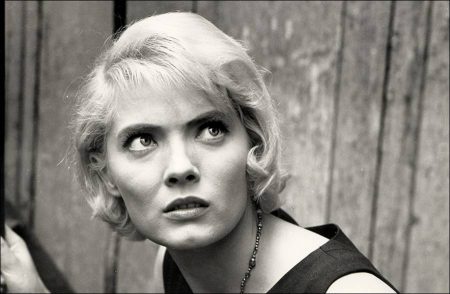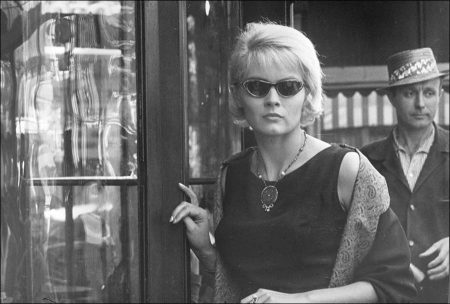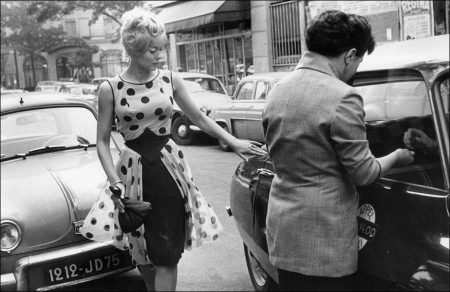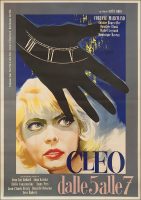Cléo from 5 to 7 movie storyline. Two hours from 17:00 to 19:00h on the longest day of the year in the life of a young Parisienne is presented. Florence Victoire, who is better known by her stage name Cléo Victoire (as in Cleopatra), is a singer with three hit singles to her name, and as such some renown. Two days ago, she went in for some tests for abdominal issues to see if it is cancer. She will be getting the results today at 18:30h.
She is certain that it will be a terminal cancer diagnosis, her mind fixated on that outcome and what it actually means. This belief affects how she approaches the day, from her encounters with friends and acquaintances to what she observes in total strangers around her. It could be as simple as how she views the lyrics to new songs presented to her from her songwriting team, to her feelings about a conversation she overhears in a café between a couple having relationship problems, to the typical sweet nothings spoken to her from her lover, José.
There are certain things that do temporarily take her mind off of waiting for the test results, but something will always bring her back to that as the issue of her day. It isn’t until just before she is ready to call the doctor that she may get a different perspective of the day and thus her life in a chance meeting with a stranger named Antoine, a French soldier at the very end of a three week leave from the Algerian War.

Cléo from 5 to 7 (French: Cléo de 5 à 7 [kle.o də sɛ̃k a sɛt]) is a 1962 French Left Bank film by Agnès Varda. The story starts with a young singer, Florence “Cléo” Victoire, at 5pm on June 21, as she waits until 6:30pm to hear the results of a medical test that will possibly confirm a diagnosis of cancer. The film is noted for its handling of several of the themes of existentialism, including discussions of mortality, the idea of despair, and leading a meaningful life. The film also has a strong feminine viewpoint belonging to French feminism and raises questions about how women are perceived, especially in French society. Mirrors appear frequently to symbolize self-obsession, which Cléo embodies.
The film includes cameos by Jean-Luc Godard, Anna Karina, Eddie Constantine and Jean-Claude Brialy as characters in the silent film Raoul shows Cléo and Dorothée, while composer Michel Legrand, who wrote the film’s score, plays “Bob the pianist”. It was entered into the 1962 Cannes Film Festival.
Themes of the Film
While the film takes place in France, away from the Algerian front, the influence of Algerian war for independence is still strong. The war greatly affected France during the 1950s and 1960s, where the demands for decolonization were the strongest. The soldier who Cléo meets towards the end of the film, Antoine, is on temporary leave from fighting in Algeria. Antoine also builds on the theme of existentialism that the film conveys, with his claims that the people in Algeria are dying for nothing. There are also protests on the street that Cléo encounters while taking a taxi back to her home.
Cléo from 5 to 7 embodies the stereotypes that men subject women to and their oppressiveness. Cléo commonly complains that no one takes her seriously since she’s a woman, and that the men think that she’s faking her illness for attention. She seems to go along with these stereotypes as well, as many women in France did, telling herself essentially that beauty is everything by saying “as long as I’m beautiful, I’m alive.”
Beginning in the 1940s, the French intellectual scene was dominated by existentialism, a movement in philosophy that would greatly influence art in France well into the 1960s. Cléo from 5 to 7 is largely an existential film, as for the entirety of the film, Cléo struggles with her existence and the potential of facing her mortality. The impending results of her medical exam and the mere possibility that she may be diagnosed with cancer leaves Cléo open to an existential mind where she is aware of her own mortality. Further, upon meeting Antoine, the soldier talks about the deaths of the Algerian War, and that they are dying for nothing and without a purpose, further appealing to the existential philosophy.
Cléo from 5 to 7 (1962)
Directed by: Agnès Varda
Starring: Corinne Marchand, Antoine Bourseiller, Dominique Davray, Dorothée Blanc, Michel Legrand, Lucienne Marchand, Serge Korber, Jean-Luc Godard, Anna Karina, Sami Frey, Eddie Constantine
Screenplay by: Agnès Varda
Production Design by: Jean-François Adam
Cinematography by: Jean Rabier, Alain Levent, Paul Bonis
Film Editing by: Pascale Laverrière, Janine Verneau
Costume Design by: Alyette Samazeuilh
Art Direction by: Bernard Evein
Music by: Michel Legrand
MPAA Rating: None.
Distributed by: Compagnie Commerciale Française Cinématographique (CCFC)
Release Date: April 11, 1962
Views: 201


